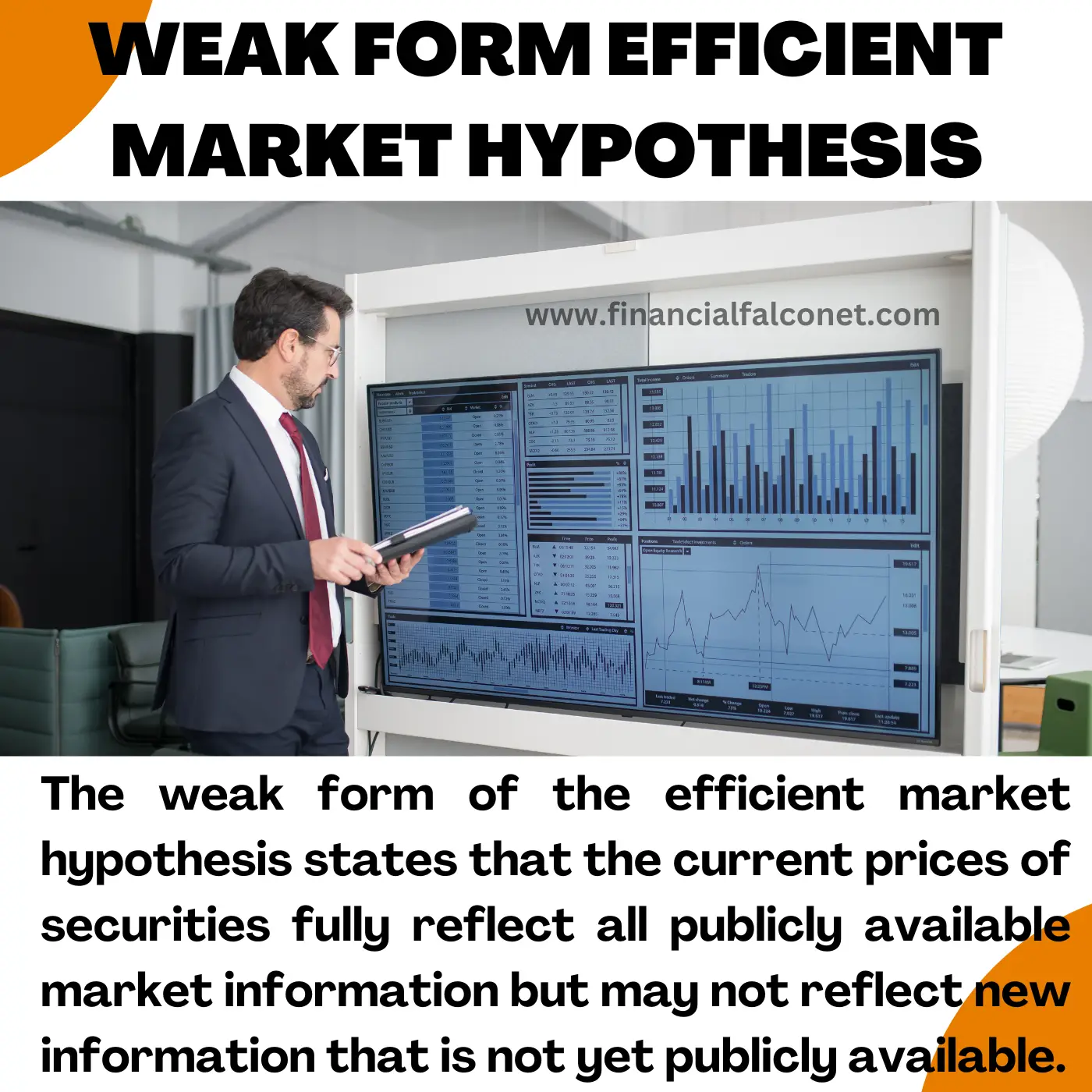The weak form efficient market hypothesis is one of the three types of efficient market hypothesis which was propounded by Eugene Fama in his 1970 work, “Efficient Capital Markets: a Review of Theory and Empirical Work.”
The work implies the existence of efficient markets and puts forth various arguments to support this position. The existence of an efficient capital market is considered crucial in the stimulation of economic development because it provides a channel for attracting investments through the purchase of stocks and other traded assets.
It also encourages business corporations that have listed assets on the capital market to observe better corporate governance due to the full disclosure requirements which enhances transparency in the business
sector.
The weak form efficient market hypothesis largely supports the efficient market hypothesis and reiterates one of the assumptions of the efficient market which states that the price of assets that are traded on financial markets are independent of past prices of these same assets.
See also: Criticism of Efficient Market Hypothesis (EMH)
Weak form efficient market hypothesis explained
The weak form of the efficient market hypothesis states that the current prices of securities fully reflect all publicly available market information but may not reflect new information that is not yet publicly available.
This means that if for instance a company plans to acquire another company but has not made the information public, its stock price will remain unchanged as it will only adjust to reflect the new information after it has been made public.
It also assumes that all past information on the security such as price, volume, and returns cannot be used to predict future prices. This is predicated on the assumption that prices of securities change randomly based on current publicly available information.
Although the weak form efficient market hypothesis explicitly implies that investors would be unable to consistently achieve superior investment returns through trading strategies based on past price, volume information, or other historical patterns; it does leave open the possibility that superior fundamental analysis may provide a means of gaining superior investment returns.

See also: What is a free market economy? characteristics and effects
What are the features of a market that is weak form efficient?
The main feature of a market that is weak-form efficient is the full reflection of past information in the prices of security.
Additional features include the random pricing of securities which is not based on historical information and the ineffectiveness of technical analysis to provide consistent above-average market returns for investors.
The concept of random pricing of securities is predicated upon the research of Professor Burton G. Milkier in his book, A Random Walk Down Wall Street.
See also: Is Crypto better than Stocks?
Assumptions of the weak form efficient market hypothesis
- No transaction costs
- Public accessibility to all relevant information
- Investors behave rationally
The above assumptions are the preconditions for the existence of the weak form efficient market hypothesis. Let us discuss each one of them:
No transaction costs
One of the assumptions of the weak form EMH is that there are no transaction costs.
Transaction costs are costs incurred in making any economic trade amounts paid when participating in a market.
For securities, the transaction costs may include exchange fees, transaction taxes, broker’s fees, and stamp duties.
However, the weak form efficient market hypothesis assumes that these costs are nonexistent. Thereby implying that investors pay the exact dollar value of the security and nothing more.
Public accessibility to all relevant information
This is another weak form efficient market hypothesis assumption which implies that since all investors are privy to the same information about the security, therefore, none of them can outperform the market.
Investors behave rationally
The theory of weak form efficiency assumes rational investors, implying that all investors will have similar risk appetites, analyze information objectively, and make similar decisions.
This assumption implies that based on market conditions, investors will buy or sell securities at the same time. This is due to every investor coming to the same conclusion about security.
Hence, further making it impossible for an investor to consistently earn above-average returns. Instead, the only way to earn above the market average is by taking on more risks.
Additionally, the weak form of EMH assumes that investors will react quickly and accurately to new information such that their actions further ensure that the prices of securities accurately reflect all available information on the security per time.
See also: Types of Preferred Stocks
Limitations of weak form EMH
- Behavioural differences
- Abnormal market conditions
- Existence of transaction costs
Behavioural differences
Behavioral differences are one of the top limitations of the weak form efficient market hypothesis. While all investors may be privy to the same information about securities, behavioral differences ensure that they do not unanimously reach the same conclusion.
For instance, while one investor may consider a security undervalued and decide to buy based on the possible advantage they will derive once the market adjusts to correctly value the security; another investor may consider the same security as rightly valued and decide not to buy because they do not envision any positive prospects.
Additionally, the risk appetite of investors is not the same, hence what may be considered a risky investment by one investor may be considered low risk by another investor.
These differences in behavioral patterns in the real world limit the efficacy of the weak form efficient market hypothesis.
Abnormal market conditions
The bane of the weak form of EMH is the assertion that past data is irrelevant in determining future outcomes in the market.
However, some market anomalies such as recurring increases in returns from stocks during certain periods over several decades contradict this assumption of the weak form efficient market hypothesis.
Examples of such abnormal market conditions are the recurring higher stock returns a day before a holiday or within the first three and last trading days of the month. This phenomenon has been tagged the pre-holiday effect and the turn-of-month effect respectively.
Existence of transaction costs
Another limitation of the weak form efficient market hypothesis is the existence of transaction costs. This means that for investors to take part in the securities market, they must pay transaction costs such as exchange and broker’s fees.
See also: Overvalued and undervalued stocks
Practical applications of weak form EMH
Despite the limitations of the weak form efficient market hypothesis, it still has some practical applications in real life.
For portfolio managers, the realization that they cannot always depend on past market information such as records of previous returns on investment to predict future returns is very beneficial.
It enables portfolio managers to build their investing strategies around other relevant information that is useful in carrying out fundamental analysis such as financial statements, industry news, and public perceptions.
In this way, portfolio managers are better able to achieve higher-than-average market returns for their clients.
Similar to portfolio managers, investors also benefit from the weak form of EMH. Since the weak form efficient market hypothesis asserts that investors cannot consistently beat the market using historical data, this insight provides investors with reasons why they need to diversify their investments.
Therefore, they could invest in other kinds of assets that have a good interest rate. Additionally, instead of relying solely on past market data to consistently outperform the market, investors may use investment strategies that are a mix of historical trends and current information.
See also: What are Large Cap Stocks? List and Examples
What does the weak form of the theory of efficient markets assert?
The weak form of the efficient market hypothesis asserts that the current price of securities already reflects all past information. Thus technical analysis is of no use as it does not lead to earning above-average returns.
It also asserts that investors should behave rationally and there should be no transaction costs when trading securities.
These assertions have helped make investors and portfolio managers deploy other effective investing techniques outside of historical data to enable them to earn above-average returns on their investments.
One such technique is the exploitation of mispricings that may be found in the market when a fundamental analysis is carried out.
Some limitations of the weak form efficient market hypothesis such as the recurrent trends of higher returns around certain seasons may also be exploited such that investors benefit.
Blessing's experience lies in business, finance, literature, and marketing. She enjoys writing or editing in these fields, reflecting her experiences and expertise in all the content that she writes.
